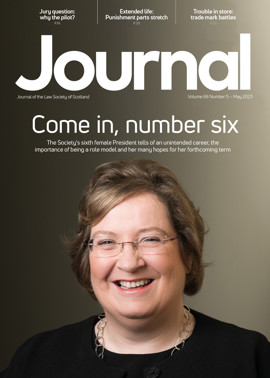Scottish Solicitors' Discipline Tribunal
Daniel Anthony McGinn
A complaint was made by the Council of the Law Society of Scotland against Daniel Anthony McGinn, solicitor, Motherwell. The Tribunal found the respondent guilty of professional misconduct in respect that: (1) he took instructions from the secondary complainer to act on her behalf in relation to a medical negligence claim and ceased to act without just cause; and (2) he failed to advise the secondary complainer that he was ceasing to act on her behalf.
The Tribunal ordered that the name of the respondent be struck off the Roll of Solicitors in Scotland.
The respondent took instructions from the secondary complainer in April or May 2016 to act in a medical negligence claim. He applied for legal aid. He wrote to Central Legal Office for the National Health Service. He closed his business around October 2016 and did not renew his practising certificate. He effectively disappeared without communicating with his client. The complainer’s enquiries in November 2016 revealed that the respondent had vacated his office premises and they were empty. In the first quarter of 2017 the triennium expired in relation to the medical negligence claim.
Solicitors must act in the best interests of their clients (rule B1.4.1). They must communicate effectively (rule B1.9.1). They must not cease to act for clients without just cause and without giving reasonable notice or in a manner which would prejudice the course of justice (rule B1.12). By his conduct, the respondent breached all of these rules. The Tribunal was satisfied that the respondent’s conduct represented a serious and reprehensible departure from the standards of competent and reputable solicitors. His conduct was deplorable and is precisely the kind of behaviour that gives the legal profession a bad name. Solicitors cannot abandon a solicitor-client relationship without reference to their professional responsibilities. There is a well-established process for winding down a legal practice which protects clients and keeps them informed. The respondent’s serious and reprehensible departure from the standards of competent and reputable solicitors meant that the secondary complainer was deprived of very important information relating to her claim when the time for raising it was close to expiration.
Damien Tonner
A complaint was made by the Council of the Law Society of Scotland against Damien Christopher Tonner, having a place of business at Clyde & Co, Edinburgh. The Tribunal found the respondent guilty of professional misconduct in respect of his breach of rules 3 and 9 of the Solicitors (Scotland) (Standards of Conduct) Practice Rules 2008 and rules B1.4 and B1.9 of the Law Society of Scotland Practice Rules 2011. The Tribunal censured the respondent.
The respondent failed to provide the secondary complainer with the summons and defences lodged in her personal injury action. She was therefore unaware of the defence and the likelihood that her case would fail. The respondent failed to tell the secondary complainer about the potential conflict of interest or her right of action against the firm. She was not told that she might wish to take independent advice.
Solicitors must act in the best interests of their clients. They must be fearless in defending their clients’ interests, regardless of the consequences to themselves (rule 3 of the Solicitors (Scotland) (Standards of Conduct) Rules 2008 and rule B1.4 of the Law Society of Scotland Practice Rules 2011). Solicitors must communicate effectively with their clients and others. They must provide any relevant information which is necessary to allow the clients to make informed decisions. Information must be clear and comprehensive and where necessary or appropriate, confirmed in writing. Solicitors must advise their clients of any significant development in relation to their case and explain matters to the extent reasonably necessary to permit informed decisions by clients regarding the instructions which require to be given by them (rule 9 of the Solicitors (Scotland) (Standards of Conduct) Rules 2008 and rule B1.9 of the Law Society of Scotland Practice Rules 2011).
Having regard to all the circumstances, which included the respondent’s inexperience in this area of law, and the involvement of his supervising partner once the error was discovered, the Tribunal was satisfied that the respondent’s conduct represented a serious and reprehensible departure from the standards of competent and reputable solicitors. While not every communication has to take place in writing, the respondent ought to have communicated these issues in writing to the secondary complainer at a much earlier stage. There was a continuing failure for a lengthy period to communicate with the client properly and to act in her best interests. The secondary complainer was not kept informed of major developments which affected her.
The Tribunal declined to award compensation to the secondary complainer.
Perspectives
Features
Briefings
- Civil court: Spotlight on the Sheriff Appeal Court
- Employment: Must do better – the s 23 approach
- Human rights: Crime, detention and mental health issues
- Pensions: A question of tax
- Scottish Solicitors' Discipline Tribunal: May 2023
- Family: The slide rule of grave risk
- In-house: A route to diversity






